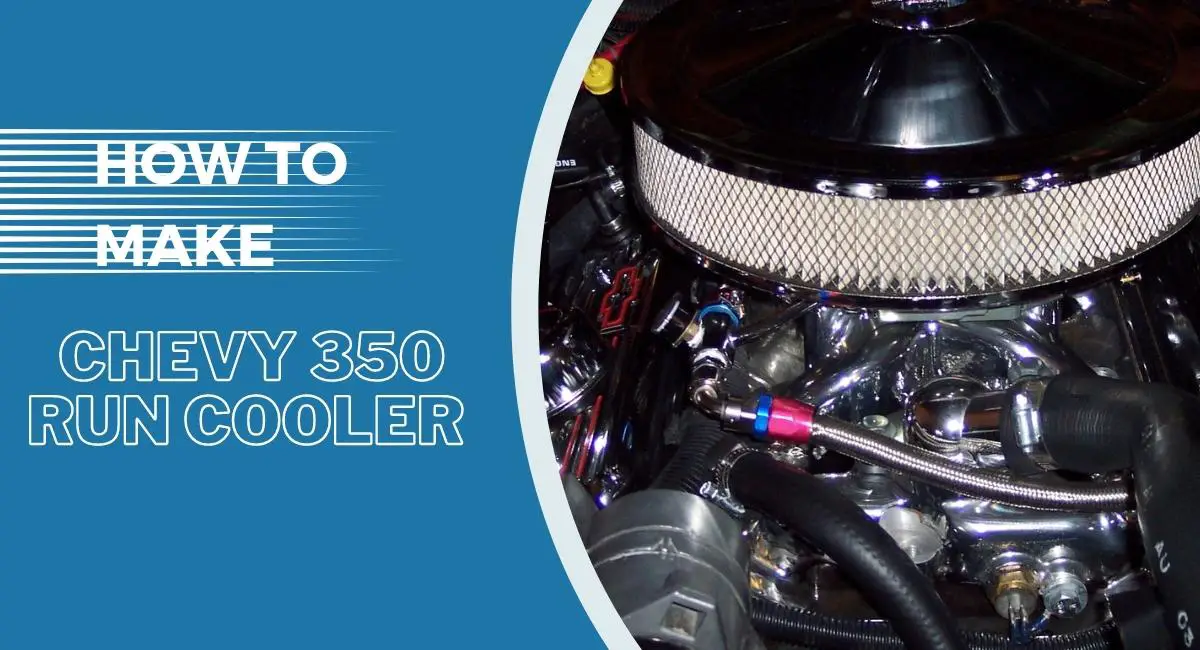The Chevy 350 engine is a workhorse known for its reliability and power. However, like any engine, it can be overheated if improperly maintained, leading to significant performance issues and even engine damage.
If your Chevy 350 overheats, it results from insufficient coolant levels, malfunctioning thermostat, cooling system leaks, and Radiator Fan Failure. It’s crucial to address any overheating issues promptly to prevent potential engine damage. Regular maintenance, proper coolant levels, and timely replacement of faulty components are key to keeping the Chevy 350 engine running at an optimal temperature.
This comprehensive guide will explore various steps and tips to help you make your Chevy 350 run cooler, ensuring optimal performance and longevity.
Understanding the Chevy 350 Cooling System
The Chevy 350 cooling system is vital for regulating engine temperature. It comprises several key elements, including the radiator, water pump, thermostat, cooling fan, and hoses. Each part plays a crucial role in maintaining the ideal operating temperature for the engine.
Common Causes of Chevy 350 Overheating
Before diving into the solutions, it’s essential to understand the common causes of Chevy 350 overheating. Several factors can cause the Chevy 350 engine to overheat, as explained.
Insufficient Coolant Levels
Low coolant levels can lead to inadequate heat transfer and cooling capacity. It may be due to coolant leaks, a malfunctioning radiator cap, or an improper coolant mixture. Regularly check the coolant levels and top up as needed with the appropriate coolant type recommended by the manufacturer.
Malfunctioning Thermostat
The thermostat regulates the flow of coolant through the engine. If stuck in the closed position, it restricts coolant flow, leading to overheating. The engine may not reach the optimal operating temperature if the thermostat fails. It is possible to replace a malfunctioning thermostat promptly.
Blockages in the Cooling System
Over time, debris, rust, and sediment can accumulate in the cooling system, leading to blockages. These blockages restrict the flow of coolant and impede proper heat transfer. Flushing the cooling system helps remove these blockages and maintain efficient cooling.
Radiator Fan Failure
The radiator fan plays a crucial role in dissipating heat from the coolant. If the fan fails, it can result in inadequate airflow through the radiator, leading to overheating. Check the operation of the fan motor, wiring, and relays. Replace faulty components.
Water Pump Issue
The water pump circulates coolant through the engine and radiator. If the water pump fails, coolant circulation is compromised, resulting in poor heat transfer and increased engine temperature. Look for signs of a leaking or worn-out water pump and replace it if necessary.
Cooling System Leaks
Coolant leaks can lead to a loss of coolant, which disrupts the cooling system’s ability to regulate engine temperature effectively. Common areas for leaks include radiator hoses, heater hoses, the radiator itself, and the water pump. Inspect the cooling system for any signs of leaks and repair them promptly.
Engine Overload or High RPMs
Excessive load on the engine, especially towing heavy loads or driving in extreme conditions, can generate excessive heat. Similarly, consistently running the engine at high RPMs can lead to increased heat buildup. Avoid unreasonable load and high RPMs whenever possible to prevent overheating.
Faulty Temperature Sensor or Gauge
A malfunctioning temperature sensor or gauge can provide inaccurate readings, leading to false indications of overheating. Ensure the temperature sensor and gauge are functioning correctly and replace any faulty components if necessary.

How to Make Chevy 350 Run Cooler
Is your Chevy 350 overheating? Learning how to make a Chevy 350 Run cooler is relatively straightforward. Below are some tips to try:
Regular maintenance and inspection
It’s essential to perform regular maintenance and inspections to keep your engine running cool. Check the coolant levels regularly and ensure they are within the recommended range. Additionally, flushing the cooling system helps remove any buildup or contaminants hindering proper heat transfer. Inspect hoses and belts for signs of wear and tear, replacing them as needed to maintain optimal performance.
Enhancing cooling system efficiency
Upgrading the radiator to one with improved cooling capacity is a smart investment. Look for a radiator with larger tubes and increased core surface area to improve heat dissipation. Additionally, installing a high-flow water pump can enhance coolant circulation, leading to more efficient heat transfer. Adding a cooling fan shroud helps direct airflow through the radiator, preventing air from bypassing it. Consider using a high-performance electric radiator or auxiliary fan for additional cooling power.
Important Read: Understanding and Resolving Key Fob Sensitivity Issues in Your Car
Optimizing airflow
Proper airflow is crucial for maintaining the engine when Chevy 350 overheating and temperature. Regularly clean the radiator and condenser from dirt, debris, and insects that can obstruct airflow. Ensure there are no obstructions in the grille that may impede air intake. Installing a hood scoop or vents can help channel cool air directly to the engine bay. At the same time, heat-resistant coatings or wraps on the intake manifold and exhaust components minimize heat transfer to surrounding areas.
Controlling engine temperature
The thermostat plays a vital role in regulating Chevy 350 thermostat temperature. Choosing the right thermostat is crucial; opting for a cooler thermostat can help maintain lower operating temperatures. Additionally, adjusting the fan temperature switch can ensure the cooling fan engages at the desired temperature, providing better control over engine heat.
Additional cooling system considerations
Using a coolant additive can enhance the cooling system’s performance by improving heat transfer and preventing corrosion. Ensure that the engine’s timing and fuel mixture are set properly, as incorrect settings can lead to excessive heat generation. Avoid subjecting the engine to unreasonable load and high RPMs, as these can increase heat buildup.
Conclusion
Maintaining a cooler-running engine is essential for the optimal performance and longevity of your Chevy 350. You can effectively mitigate overheating issues by implementing the tips outlined in this article, such as regular maintenance and inspections, enhancing cooling system efficiency, optimizing airflow, controlling engine temperature, and considering additional cooling system considerations. Remember, a well-maintained and properly cooled engine ensures a smoother driving experience and helps protect your investment in the long run.
